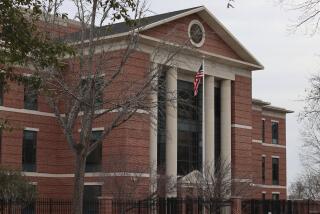Lingering Chechen Fight Embarrasses the Kremlin : Russia: Small-scale rebel attacks trigger a heavy-handed reaction from Moscow’s troops.
President Boris N. Yeltsin’s war took a nasty turn the other day when Chechen snipers attacked a Russian guard post on a bridge here.
A Russian soldier and an elderly one-legged man who was crossing the bridge on crutches were wounded during the daytime ambush. After the attack, Russian vehicles raced through the streets for 40 minutes, firing in all directions. The snipers escaped, but an unarmed Chechen man died and two companions were severely injured when an armored personnel carrier rolled over their car and crushed it.
Since Yeltsin declared an April 28 cease-fire to try to silence Chechnya for his moment on the world stage, Chechen separatists have stepped up their attacks on military targets and brought the war back to Grozny, the bomb-shattered capital they abandoned three months ago.
Russia’s military command said Friday that the rebels had struck 105 times in the previous week, killing 12 government soldiers and wounding 38 others still under Yeltsin’s orders not to shoot first. One of the dead was a reconnaissance pilot whose plane was shot down Friday.
While small in scale, the guerrilla attacks are a sign that the Russians are in for a long, unpleasant stay in the tiny Muslim republic they have all but subdued after five months of occupation and an estimated 20,000 deaths.
The fighting is an embarrassment to Yeltsin as he prepares to welcome President Clinton and the leaders of more than 50 other countries to Moscow for Tuesday’s celebration marking the 50th anniversary of the defeat of Nazi Germany in World War II. On Wednesday, Yeltsin will hold a summit with Clinton, who has criticized the Russian leader for failing to end the Chechen conflict.
Equally humiliating for Moscow, the daily raids by stealthy bands of Chechens have provoked such a heavy-handed reaction by Russian troops in Grozny that people who once welcomed them are clamoring for the troops to leave.
On Saturday, a day after the shootout at the bridge, 200 angry residents of Grozny’s Kalinin district confronted the local Russian Interior Ministry commander at an outdoor meeting with complaints of drunkenness, vandalism and wild shooting by his troops. Speaker after speaker said the city was far more terrorized by Russian forces than any guerrilla threat.
“We have tried over and over to communicate with you, but all we hear in response is the burst of your automatic rifles,” Said Dibiyev, an anti-separatist community leader and professor at Grozny’s Petroleum Institute, told the commander. “Take your headquarters away. Let us defend ourselves.”
The Russians, however, are in no rush to leave.
After their inept December invasion, the Russians plodded on to capture all the major towns in Chechnya’s northern plains. They drove Gen. Dzhokar M. Dudayev, the separatist Chechen president, from his Grozny palace and have destroyed most of his supporters’ armor and artillery.
But Col. Gen. Anatoly S. Kulikov, the top Russian commander here, says that nearly half the 57,500 troops who invaded Chechnya must remain into the summer because they are still opposed by 7,000 fighters who have withdrawn to the Caucasus Mountains in the south of the republic.
Inhibited by the cease-fire and the daunting terrain, the Russians have balked at pursuing the rebels in a ground campaign, preferring to lob long-range missiles and drop bombs. While Yeltsin’s don’t-shoot-first order restrains close combat, mountain villagers say it doesn’t seem to apply at a distance.
The result in scattered mountain villages is random death from the skies and almost-daily protests by white-bearded village elders outside Russian command posts.
In Serzhen-Yurt, once a mecca for health spa vacationers, two teen-age boys were killed by missiles while herding cattle April 30, according to neighbors.
Last week, Russian bombs fell on the southeastern village of Nozhay-Yurt and the western town of Bamut--apparent funneling points for weapons still trickling to the guerrillas from outside Chechnya.
At their new mountain headquarters in Vedeno, 38 miles southeast of Grozny, the separatists do not sound like a force on the verge of defeat. Hidden by thick forests from aircraft and isolated by winding roads that make tank assaults unthinkable, they say they move with surprisingly little resistance to harass Grozny and other lowland targets.
“We have enough military potential to continue the war for years, enough weapons to make certain the Russians will never feel secure on this land,” said Elias Akhmadov, a member of Dudayev’s general staff.
Yeltsin, uneasy with the prospect of a long conflict, has bowed to Western pressure and allowed the Organization for Security and Cooperation in Europe to seek to mediate the conflict.
The OSCE mission got off to a rough start Thursday when three members arrived in Vedeno looking for Dudayev. Their driver, a Chechen who agitated against the separatists before the war, was arrested as a traitor and held overnight. The Chechens later agreed to pass a mediation proposal along to Dudayev’s hide-out.
Clinton has urged Yeltsin to encourage peace talks by extending the cease-fire beyond its expiration Friday. But the Russian leader is under counter-pressure from military commanders who say that will only aid the guerrillas.
“We can’t stop when we’ve reached halfway,” said Lt. Col. Sergei Makarov, the Russian commander of Gudermes, Chechnya’s second-largest city. “We have to use other tactics, more aggressive tactics. When your enemy doesn’t surrender, what else can you do?”
More to Read
Start your day right
Sign up for Essential California for news, features and recommendations from the L.A. Times and beyond in your inbox six days a week.
You may occasionally receive promotional content from the Los Angeles Times.






